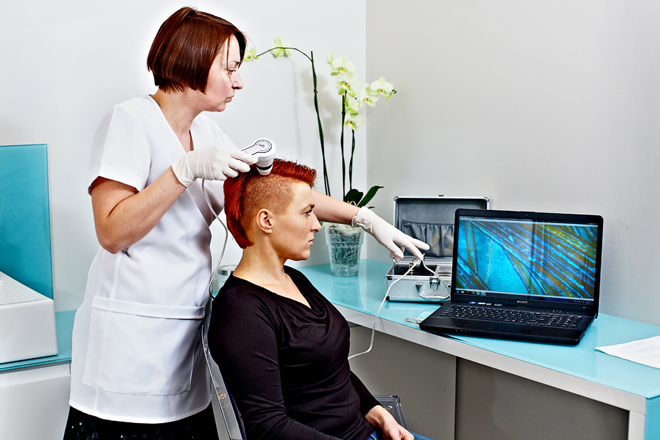‘Trichology is the branch of dermatology that deals with the scientific study of the health of hair and scalp.‘ – such a definition is provided on Wikipedia. The most typical ailments that are treated in a trichology’s office are, among others, excessive hair loss, psoriasis, dandruff and baldness.
The funny fact is that you do not have to be affected by any of dermatological problems to make an appointment with a trichologist.
 Fairly recently hairdresser’s salons have beefed their offers up by including basic trichology tests. It was the response to growing popularity of such procedures. In fact, this trend should not make anybody surprised because trichology tests are not typical medical procedures, that are conducted only when a patient is sick. You can see a trichologist even when your hair is perfectly fine. So what is the reason for doing this? A trichologist will examine your hair and guide you through the kinds of cosmetics that will make your strands look even prettier; s/he will tell you how to treat your hair, in general. How does such examination look like?
Fairly recently hairdresser’s salons have beefed their offers up by including basic trichology tests. It was the response to growing popularity of such procedures. In fact, this trend should not make anybody surprised because trichology tests are not typical medical procedures, that are conducted only when a patient is sick. You can see a trichologist even when your hair is perfectly fine. So what is the reason for doing this? A trichologist will examine your hair and guide you through the kinds of cosmetics that will make your strands look even prettier; s/he will tell you how to treat your hair, in general. How does such examination look like?
MIND YOU! You should never go to a trichologist with freshly shampooed hair. To clarify, scalp should be at least 12 hours after shampooing to facilitate defining the level of sebum production.
The task of trichologist is to define the condition of scalp and hair. To do that, a digital microscope is used that takes from 4 to 8 pictures of scalp in a great close up (from 200 to 600 x zoom). Even though, trichology tests focus mainly on examining hair bulbs, a specialist is also expected to take a look on hair ends using a magnifying glass. Thanks to such a zoom, it is easier to notice every, even the tiniest change in hair structure. Only then can a trichologist measure what is the scale of split ends, whether the skin surface is affected by any lesions, whether sebum is produced in proper quantities, and even whether hair bulbs are properly rooted into follicles.
Possible problems with hair might become obvious during the examination. So, when a person decided to undergo such prophylactic trichology tests, s/he can learn, for example, about onset of baldness which is hard to notice for a regular person. Obviously, every single problem a trichologist observes should be analysed later on in order to define its source. Thanks to this, the specialist can suggest a treatment, like deep scalp cleansing, mesotherapy or a series of appropriate cosmetic treatments.
The good news is that the time devoted to trichology tests is never considered as wasted, even when our scalp appears to be completely fine. Thanks to being aware of the fact what type of hair and scalp we have, a trichologist can give us some advice concerning day-to-day hair care procedures that we should adopt. We will also learn, what cosmetics should we use and what hair products should be given a wide berth.
